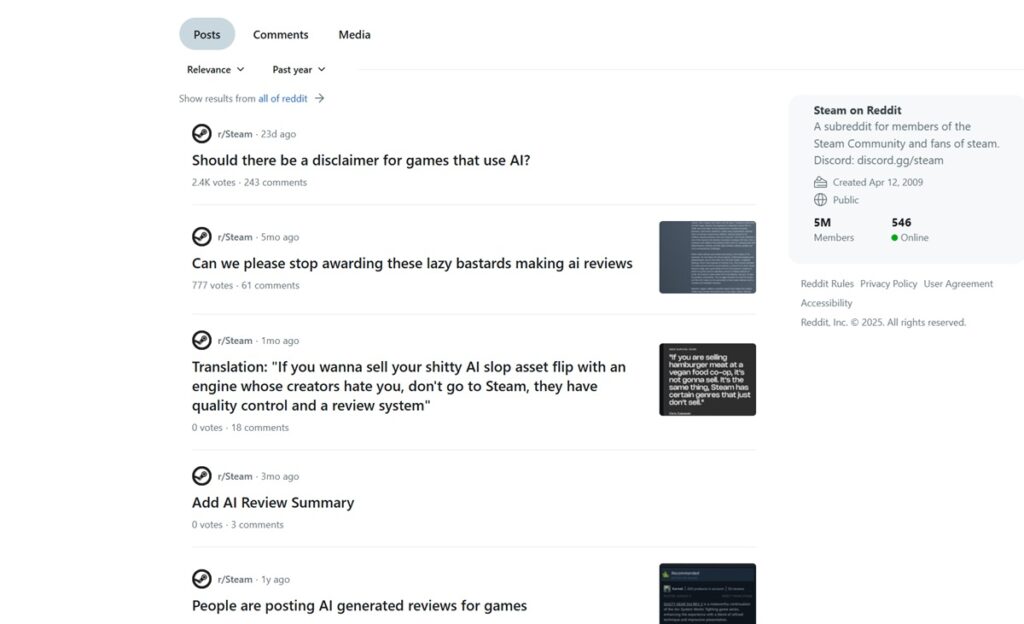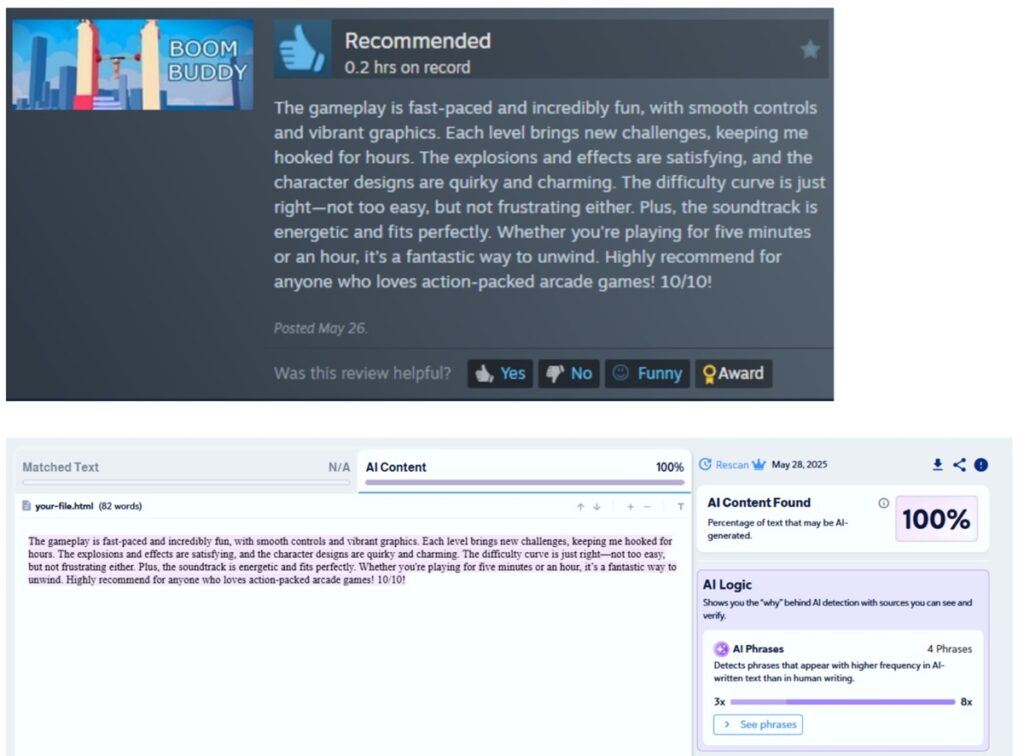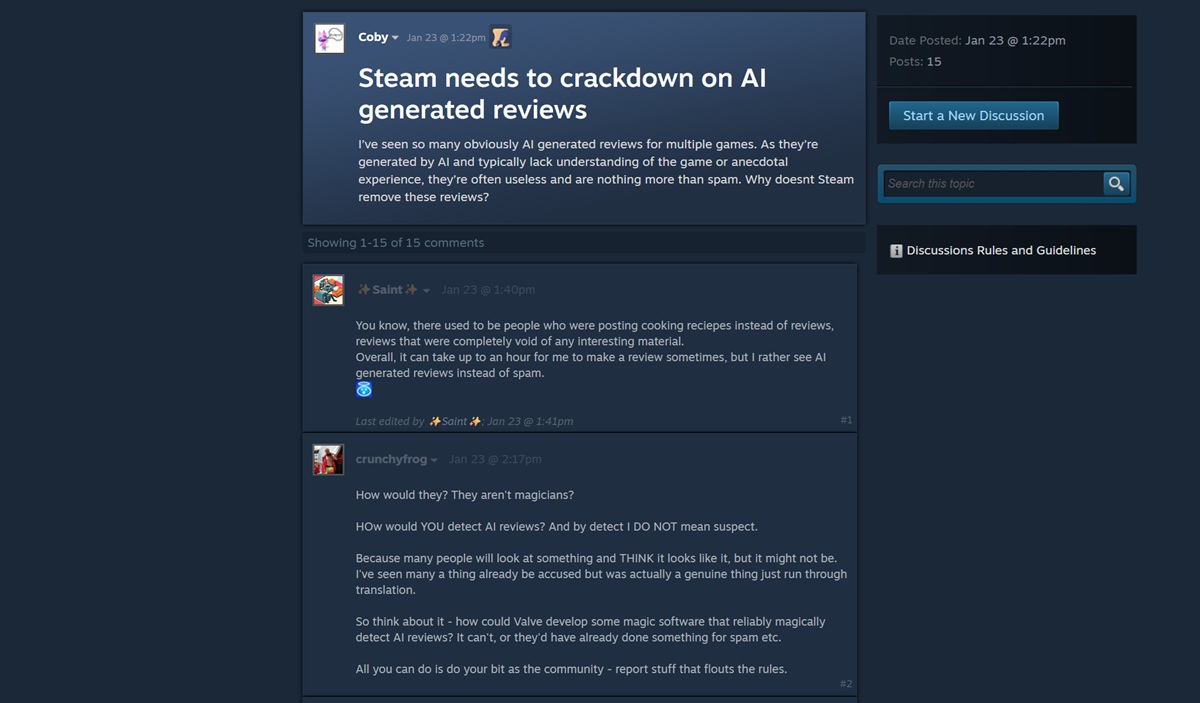Steam reviews are a critical part of feedback gamers get about the best new games. But a report from the Copyleaks research says there’s an increase in suspicious AI-generated reviews that threaten Steam’s integrity.
Valve’s Steam is the world’s largest digital distribution platform for PC games, with more than 171 million visits in April according to Similarweb. Copyleaks analyzes materials for signs of being created by AI rather than humans.
In this ecosystem, user reviews aren’t just feedback, they’re essential to a game’s visibility, sales, and reputation. But could AI be undermining this critical system?
The Copyleaks research team conducted an analysis of a network of Steam users initially
flagged by Reddit communities for suspicious, potentially AI-generated review activity. Below is a look at what Copyleaks found – but first, it’s important to understand why user reviews matter so much on Steam.
The Power of Steam Reviews

Steam reviews play a key role in a game’s visibility and discovery.
● Algorithmic Thresholds: Steam’s algorithm begins to surface a game more prominently once it receives 10 user reviews. This milestone also unlocks a visible review summary (e.g., “Mostly Positive,” “Mixed”), which makes the game more discoverable in placements like the Discovery Queue.
● Lasting Impact: Hitting this threshold early can have a compounding effect. Even moderate engagement can lead to sustained visibility and traffic, especially if reviews remain positive. Reviews also serve as powerful social proof that shapes consumer decision-making.
● Trust in Numbers: Steam users often rely heavily on review volume and sentiment when deciding whether to purchase a game. A high number of positive reviews serves as social proof, signaling credibility and quality.
● Review Score Labels: Summary tags such as “Very Positive” or “Overwhelmingly Negative” are displayed prominently and can influence perception before a user even reads the actual reviews.
The Emerging Issue of AI-Generated Reviews
Despite robust guidelines covering abuse, spam, and off-topic content, as of May 2025, Steam’s publicly available Subscriber Agreement currently does not appear to have any explicit policy against AI-generated reviews.
Still, concern within the community is growing. Steam users have flagged numerous reviews that appear to lack genuine gameplay experience, personal context, or even basic relevance – common traits of generative AI output. This is occurring across Steam services.
It is also occurring on third-party sites and apps, like Reddit. In the last year, Copyleaks found dozens of posts on Reddit, and hundreds of comments, related to AI-generated reviews on Steam.
Copyleaks Analysis: Coordinated AI Review Activity
Through a manual review, Copyleaks identified a pattern of suspicious accounts posting high volumes of formulaic, seemingly AI-generated reviews. What emerged was a kind of nesting-doll effect: one account posting an AI-generated review on a game often coincided with other accounts posting similarly structured, likely AI-generated reviews on the same titles.
One notable example is the user +negative, who has published nearly 360 reviews since 2023. A significant portion of these reviews display common hallmarks of generative AI, including:
● Repetitive phrasing across different game genres
● Generic praise or criticism with minimal game-specific detail
● Absence of personal insight or gameplay anecdotes
Recent examples of these reviews include here, here and here.
Copyleaks first identified this account based on a review for the game Dark Times from December 2024. The review was the target of a Reddit post titled, “Most Blatant ChatGPT Review I’ve Seen Yet.” Copyleaks’ analysis confirmed that the review is highly likely to be AI-generated.

According to Copyleaks’ AI Logic analysis—which evaluates specific phrases and patterns against its extensive library of AI- and human-generated content—certain language in the review strongly indicates AI authorship. For example, the phrase “facing formidable adversaries” is 682 times more likely to appear in AI-generated content, while “could involve navigating” is 231 times more likely.
To investigate further and assess potential network behavior, Copyleaks examined reviews across several titles reviewed by +negative and found additional examples of likely AI- generated content. For instance, on the game Boom Buddy, which +negative reviewed recently, multiple other accounts also posted reviews that appeared to be AI-generated, per a Copyleaks review.
Additionally, Copyleaks examined other game pages where these accounts had posted and uncovered more suspicious reviews. On another title reviewed by one of the same accounts, Copyleaks identified the following likely AI-generated review.
According to Copyleaks’ AI Logic analysis, one phrase from this review is 416 times more likely to appear in AI-generated text than in human-written content. Final Thoughts
Steam reviews are key to how games are discovered, evaluated, and trusted on the platform.
But with the rapid rise of generative AI, combined with the growing availability of botnet tools, this system faces some risk for inauthentic behavior. Copyleaks’ research shows how potentially AI-generated reviews can slip through in an effort to manipulate user perception and artificially boost a game’s visibility and interest, Copyleaks said.
As the line between human and AI-written reviews blurs on all platforms, stronger detection tools and clearer policies will be essential to maintaining authenticity and, most importantly, trust, Copyleaks said.


